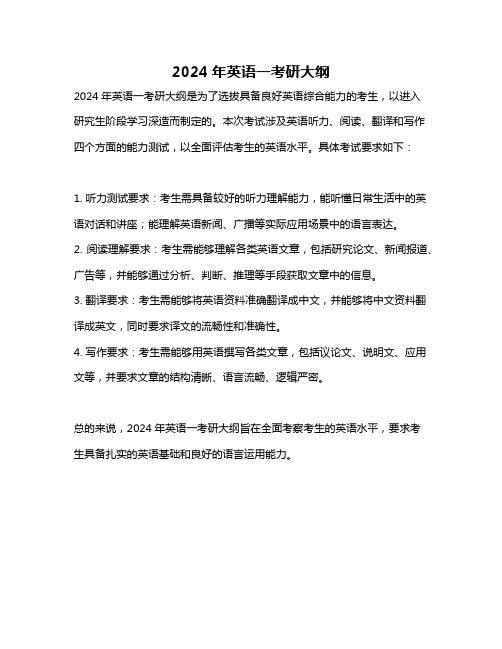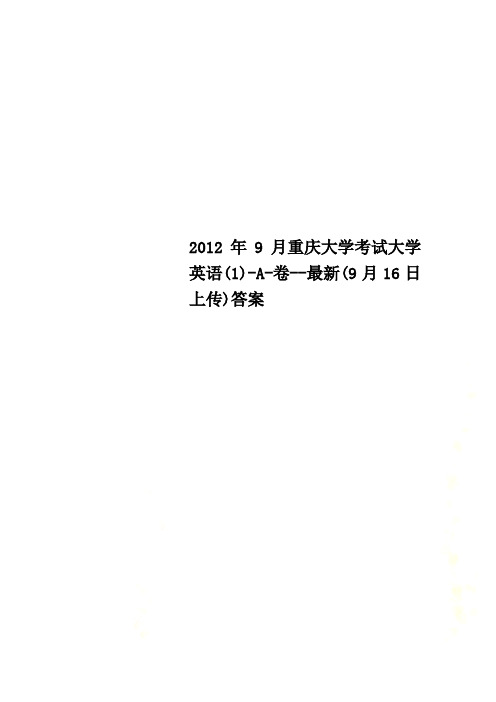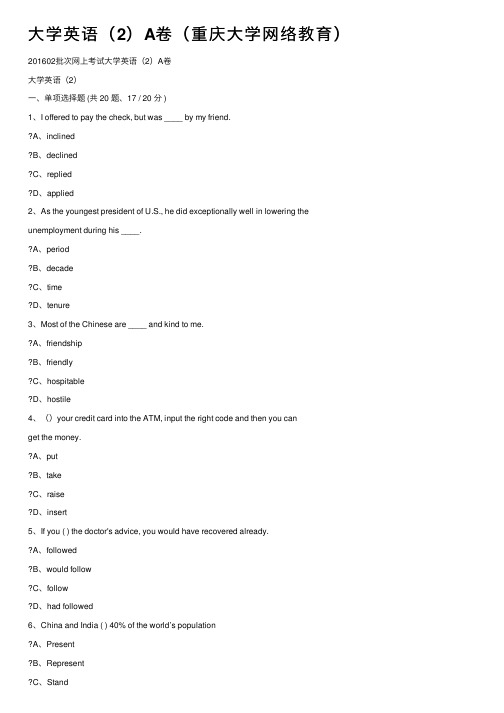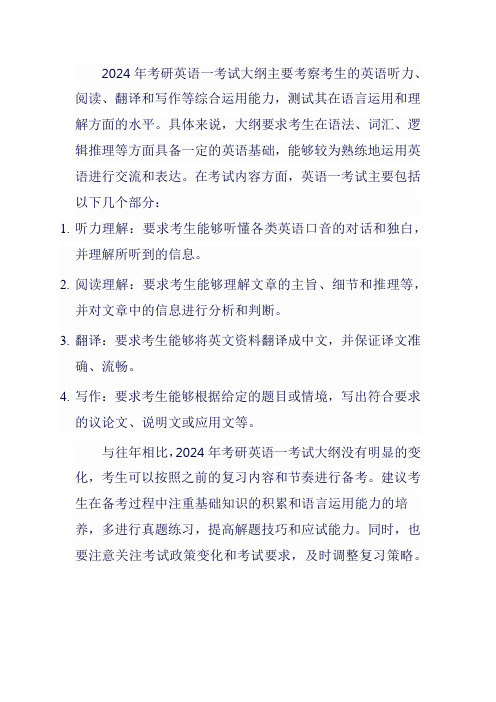重庆大学《大学英语》(1-4)考试大纲
重庆大学2019年10月网上考试《大学英语(1)》B卷辅导答案

2019年10月网上考试《大学英语(1)》B卷1.[单选题]At first ____, she is not pretty, but gradually you'll find she is such a lovely girl.A.lookB.glanceC.visionD.glimpse答:D2.[单选题]Only when he was put in prison, ____ how silly he was and what a serious harm he had did to her.A.should he have realizeB.he realizedC.did he realizeD.he had realized答:C3.[单选题]Seldom____such a funny story as he told us.A.have I heardB.I have heardC.did I listenD.I listened答:B4.[单选题]For centuries, the Atlantic Ocean kept the New World from____by the people of Europe.A.discoverB.discoveredC.discoveringD.being discovered答:D5.[单选题]Some children spend most of their free time _____television.A.lookingB.seeingC.watchingD.observing答:C6.[单选题]The football match was televised____from the Capital Stadium.A.aliveB.liveC.livingD.lively答:B7.[单选题]Sally ______to have a cup of coffee whenever she comes home.A.would likeB.would ratherC.likeD.feel like答:D8.[单选题]Once you have finished the design, you may have a whole week ______.A.offB.downC.inD.up答:A9.[单选题]We have to do this uninteresting work _____ we like it or not.A.no matterB.eitherC.whateverD.whether答:D10.[单选题]____ you have worked out the hard problem, you shall havea rest first.A.By nowB.Ever sinceC.Now thatD.In that答:C11.[单选题]We are having a _____ technical problem with one of our engines.A.lightB.slightC.brightD.slim答:B12.[单选题]She _____ quite a lot for such a young age.A.has expensedB.expensedC.experienceD.has experienced答:D13.[单选题]Rather than ____ everything to the last minute he always prefers to start early.A.leaveB.leave toC.leavingD.left答:C14.[单选题]Your handwriting has a ____ style and I can recognize it at once.A.uniquemonC.sharpD.beneficial答:A15.[单选题]She _____ accept his invitation to see a movie.A.is reluctant toB.is irrelevant toC.is favorable toD.is able to答:A16.[主观题]把大衣穿上,不然会感冒的。
重庆大学《大学英语》(1-4)考试大纲

重庆大学《大学英语》(1-4)考试大纲课程类别:基础必修课总学时数:256学时学分:14学分一、考试要求大学英语课程是我校非英语专业大学生的一门重要的必修基础课程,其教学目标是培养学生的英语综合应用能力,特别是听说能力,使他们在今后工作和社会交往中能用英语有效地进行口头和书面的信息交流。
因此,大学英语考试的目的在于准确地衡量我校大学生的英语综合应用能力和自主学习能力。
大学英语每一学期的测试分为四个级别:1、2、3、4级,由专门小组负责出题、课程教授审题,以密封卷形式集体流水阅卷、集体登分,任课老师负责把学生的成绩登录上网,学生在网上查看自己的成绩。
二、考试内容1、期末考试内容、题型和分值比例试卷由七部分组成:翻译(1级)或写作(2、3、4)级(15%),阅读(20%),听力(35%),完型填空(10%),信息转换(10%),选词填空(5%),改错(5%),总分100分。
Part I Translation (Band 1) (15 points):5个句子,汉译英Writing (Band 2.3.4) (15 points):短文写作Part II Reading Comprehension (20 points):多项选择,2篇文章,共10题。
Part III Listening Comprehension (35 points):对话(多项选择:短对话,长对话);短文理解(多项选择)和复合式听写。
Part IV Cloze Test (10 points):多项选择Part V Information Transfer (10 points):信息转换词汇填空Part VI V ocabulary (5 points):选词填空Part VII Error Correction (5 points)2、题型分解考试各部分所考核的内容和答题方式如下:(1) 写作和翻译部分考核学生用英语进行书面表达的能力。
2024年英语一考研大纲

2024年英语一考研大纲
2024年英语一考研大纲是为了选拔具备良好英语综合能力的考生,以进入
研究生阶段学习深造而制定的。
本次考试涉及英语听力、阅读、翻译和写作四个方面的能力测试,以全面评估考生的英语水平。
具体考试要求如下:
1. 听力测试要求:考生需具备较好的听力理解能力,能听懂日常生活中的英语对话和讲座;能理解英语新闻、广播等实际应用场景中的语言表达。
2. 阅读理解要求:考生需能够理解各类英语文章,包括研究论文、新闻报道、广告等,并能够通过分析、判断、推理等手段获取文章中的信息。
3. 翻译要求:考生需能够将英语资料准确翻译成中文,并能够将中文资料翻译成英文,同时要求译文的流畅性和准确性。
4. 写作要求:考生需能够用英语撰写各类文章,包括议论文、说明文、应用文等,并要求文章的结构清晰、语言流畅、逻辑严密。
总的来说,2024年英语一考研大纲旨在全面考察考生的英语水平,要求考
生具备扎实的英语基础和良好的语言运用能力。
2012年9月重庆大学考试大学英语(1)-A-卷--最新(9月16日上传)答案

2012年9月重庆大学考试大学英语(1)-A-卷--最新(9月16日上传)答案2012年9月考试大学英语(1) A 卷考试批次:201202次考试课程:大学英语(1)已做/题量40 / 40 4 / 4 1 / 1 45 / 45 得分/分值0 / 40 0 / 40 0 / 20 0 / 100一、单项选择题(共40题、总分40分)1. ( ) some mammals came to live in the sea is not known (本题分数:1 分。
)A、 WhichB、 SinceC、 AlthoughD、 How2. If you cannot go, he'll go ( ) you. (本题分数:1 分。
)A、 instead onB、 instead ofC、 instead withD、 instead to3. The water is unfit for drinking ( ) purified. (本题分数:1 分。
)A、 untilB、 besidesC、 unlessD、 except4. He was in a traffic jam, ( ) made him late for school. (本题分数:1 分。
)A、thatB、whichC、whatD、 how5. Hardly had they got to the bus stop ( ) the bus suddenly pulledaway. (本题分数:1 分。
)A、whenB、thenC、thatD、 as6. They will realize the importance of environmental protection( ). (本题分数:1 分。
)10. —Someone took my book.—Well, I didn't and ( ). (本题分数:1 分。
大学英语(2)A卷(重庆大学网络教育)

⼤学英语(2)A卷(重庆⼤学⽹络教育)201602批次⽹上考试⼤学英语(2)A卷⼤学英语(2)⼀、单项选择题 (共 20 题、17 / 20 分 )1、I offered to pay the check, but was ____ by my friend.A、inclinedB、declinedC、repliedD、applied2、As the youngest president of U.S., he did exceptionally well in lowering the unemployment during his ____.A、periodB、decadeC、timeD、tenure3、Most of the Chinese are ____ and kind to me.A、friendshipB、friendlyC、hospitableD、hostile4、()your credit card into the ATM, input the right code and then you canget the money.A、putB、takeC、raiseD、insert5、If you ( ) the doctor's advice, you would have recovered already.A、followedB、would followC、followD、had followed6、China and India ( ) 40% of the world’s populationA、PresentD、preserve7、The commander’s words ()excitement in the students and encouraged them to struggle for their motherland.A、stimulatedB、aroseC、stirredD、tiggered8、Businesses and professional services are listed in a special ( ) directory.A、ClassifiedB、ClassicalC、classD、classes9、The ministers agree ( ) global warming is a serious world problem.A、whatB、whichC、whenD、that10、-"It ()for a week!"-"Don’t worry! It ()be a fine day tomorrow."A、rains…is suppose toB、is raining … is suppose toC、has rained…is supposed toD、has been raining… is supposed to11、The questions is ( ) American and European companies understand the Russian business environment.A、ThatB、WhetherC、AsD、why12、If he had asked me, I ( ) him.A、should have helpedB、would helpC、would have helpedD、helpedB、ConversationC、TransitionD、innovation14、The fans of this music star _____ him in the hall.A、surrounded withB、crowded aroundC、grouped aroundD、huddle together15、John used to get up early, ()?A、used heB、did heC、didn''''t heD、would he16、I have no doubt ( ) he will overcome all the difficulties.A、whetherB、ifC、thatD、as to17、( ) in England for one year, I’ve got accustomed to English food now. ?A、LivedB、LivingC、Having livedD、Having been lived18、I gave him the book, but demanded that he ( ) it to me in a week.A、must returnB、returnC、would returnD、returned19、Evidently, the untethered electronic voice ( ) human contact.A、prefer toB、is preferred toC、is preferable toD、preferable to20、The office he worked for was shut down, ( ) he returned to his hometown. ?A、HoweverC、whereuponD、whereas⼆、阅读理解单项选择题 (共 2 题、10 / 20 分 )1、Think of what things would be like without cars. Our lives would be the same.We would have to use bikes, horses, or our feet to get to places. And wecouldn''t go as far as we are used to going. But we do have cars. With cars, people can come and go as they please. They can work far from home. Many people live in the country. But they work in the city. Most of them get there in cars. This means that there are a lot of cars on the road.Are there too many cars on the road? Some people think so. So they are asking that we take trains and buses. But not everyone can do this. Some people must take their cars. This is because no trains or buses go where they have to go. Maybe other people could go to work with them. Then there wouldn''t be so many cars on the road.What will our lives be like in times to come? Maybe we won''t need cars so much. Maybe more of us will work at home. Maybe trains and buses will go to more places. Then more people will be in them. This will mean more room on our streets and roads.It would be nice if people walk more. They might like to step along a street or road. They would not get far very fast. But they would have the time to look around them. Who knows? They might even feel better, too!1、What's not the possible reason why there are a lot of cars on the road?A、Because everyone likes to drive his own car to do whatever he likes. ?B、Because the number of trains and buses is small.C、Because many people who live in the country go to work in cars in the city.D、Because it is more convenient for people to go to places in cars than other means.2、According to the author, which of the following is not the reason why thenumber of cars willbe reduced in the future?A、More people will work at home.B、Trains and buses will go to more places.C、More people will take buses and trains.D、People won't need so many cars.3、It can be inferred from the passage that __.A、the author thinks that people who are in the city should not live in the countryB、the author thinks that there should be more trains and buses which should go to more placesC、the author wishes that the number of cars would be reduced so that there will be more room on the streets and roadsD、the authors believe that more walk does good to health4、What does the underlined word "please" here mean?A、to goB、to meanD、to love5、What's the writer's opinion in this passage?A、We should use more carsB、We should use fewer cars.C、We should not use carsD、We should take good care of cars.2、Your mobile phone( ⼿机) rings, and instead of the usual electronic signals, it's playing your favorite music. A friend sends you favorite song to cheer you up. One day, a record company might forward new records and music videos to your phone.The mobile business is getting into the music business. For the moment, the interest is in pleasant ring tones, but some companies are hoping to take full advantage of the next generation of mobile phone --- all-purpose gadgets ( ⼩玩意⼉) that blend phone, personal stereo, video player and Internet browser into one.Finally, record companies might send new records and videos to fans who register their numbers.The fans could pass music or songs along to friends--- a kind of musical trading card. Unlike Internet tracks, mobile downloads would be easy for recordcompanies to control, said former record industry official Ralph Simon, who is now chairman of Yourmobile, based in Santa Monica, California."If you pass a song along to other phones through a network, each phone can be charged,"said Simon."It's like going through a toll gate ( 收费站). There's more possibility for copyright control than there is on the Internet."Massachusetts-based Converse is offering a service in Portugal and theNetherlands that lets people record tunes on their voice mail or send music as presents to friends. Finally, people might be able to sing karaoke and pass them along. The company is sure that people will want to use music to reach out and touch someone.1、The underlined word “ blend” in the second paragraph most probably means( )A、sendB、becomeC、mixD、compare2、Record companies ( ) the idea of passing songs and music along mobilephones.A、are worried aboutB、are interested inC、try hard to stopD、take no notice of3、According to Ralph Simon, it would be easier to ( ) through mobile phonenetwork than through the Internet.C、pars along songs and musicD、send voice maid4、"Massachusetts- based Converse" in the six paragraph probably refers to ( ) ?A、a personB、a city in IsraelC、a state of USAD、a company5、All the following are true except( )A、The mobile companies become involved in music businessB、The mobile phone might serve as a stereo, a video play as well as an internet browserC、Your friend might sing karaoke and send it to your phoneD、The mobile network is better than the internet三、填空题 (共 10 题、0 / 20 分 )1、As long as you return the money promptly. I'll lend it to you with (please) ( ).pleasure2、We should try to learn more (economy) ( ) theory and apply it in practice.economic3、All these worries made it (possible) ( ) for her to concentrate on her work.impossible4、(face) ( ) your weak points doesn’t mean looking down upon yourself.Facing / To face5、It was ordered that no smoking (allow) ( ) in the library. (should) be allowed(should) be allowed6、By the end of this month, we surely will have found a ( ) (satisfy) solution to the problem.satisfying satisfactory7、This (decide) ( ) was made according to what my father said.C[SEPARATOR]D8、Television keeps us (inform) ( ) about current events and the latest developments in science and politics. informed9、The longer they listen to him, the (little) ( ) they like him.less10、—I'd met Smith several times before.—So (have) ( ) I.had四、问答题 (共 5 题、0 / 20 分 )1、This part is to test your ability to do practical writing. You’re required to write不要随意离开团队;有事找导游,不要私⾃处理等等Notice Dear?tourists: We are going to visit some interesting placesthis afternoon. There are some points that you have to pay attention to: First, don‘t be late or dont leave our team without permission; Second, if you have any trouble,dont deal with it by yourself. Try to inform you tourguide who will surely help you. Sincerely yours,2、给Robert 先⽣写⼀封短信。
2024英一大纲

2024年考研英语一考试大纲主要考察考生的英语听力、阅读、翻译和写作等综合运用能力,测试其在语言运用和理解方面的水平。
具体来说,大纲要求考生在语法、词汇、逻辑推理等方面具备一定的英语基础,能够较为熟练地运用英语进行交流和表达。
在考试内容方面,英语一考试主要包括以下几个部分:
1.听力理解:要求考生能够听懂各类英语口音的对话和独白,
并理解所听到的信息。
2.阅读理解:要求考生能够理解文章的主旨、细节和推理等,
并对文章中的信息进行分析和判断。
3.翻译:要求考生能够将英文资料翻译成中文,并保证译文准
确、流畅。
4.写作:要求考生能够根据给定的题目或情境,写出符合要求
的议论文、说明文或应用文等。
与往年相比,2024年考研英语一考试大纲没有明显的变化,考生可以按照之前的复习内容和节奏进行备考。
建议考生在备考过程中注重基础知识的积累和语言运用能力的培养,多进行真题练习,提高解题技巧和应试能力。
同时,也要注意关注考试政策变化和考试要求,及时调整复习策略。
重庆师范大学2020年硕士研究生招生参考书目

101思想政治理论全国指定大纲和教材199管理类联考综合能力全国指定大纲和教材201英语一全国指定大纲和教材204英语二全国指定大纲和教材211翻译硕士英语参见有关专业学位指导委员会编制的考试大纲240自命题俄语《大学俄语简明教程》张宝钤编,高等教育出版社。
241自命题法语《法语》(1—3册),马晓宏编著,商务印书馆出版。
242自命题日语《中日交流标准日本语》中级(上册前10课),人民教育出版社;《新世纪日本语教程》(自学用),清华大学外语系编,外语教学与研究出版社。
301数学一全国指定大纲和教材302数学二全国指定大纲和教材303数学三全国指定大纲和教材311教育学专业基础综合全国指定大纲和教材331社会工作原理1.《社会学概论新修(精编版)》 郑杭生,中国人民大学出版社,2014年2.《社会工作概论(第三版)》王思斌,高等教育出版社,2014年3.《社会工作综合能力(中级)》,全国社会工作者职业水平考试教材编写组,中国社会出版社,2018年333教育综合1.《教育学基础》(第三版)十二所师大编写,教育科学出版社,2014年;2.《中国教育史》孙培青,华东师大出版社,2009年;3.《外国教育史》(第二版)张斌贤,教育科学出版社,2015年;4.《教育心理学》(第三版)张大均,人教社,2015年334新闻与传播专业综合能力《新闻采访与写作》丁柏铨,高等教育出版社339农业知识综合一1.《植物学》强胜主编,高等教育出版社2.《遗传学》刘祖洞主编,高等教育出版社,2007年。
3.《植物生理学》(第六版)潘瑞炽主编,科学出版社,2008年。
340农业知识综合二1.《动物营养学》杨凤主编,中国农业出版社, 2001年。
2.《饲料学》王成章、王恬主编,中国农业出版社,2003年。
3.《动物繁殖学》(第四版)中国农业大学主编,中国农业出版社。
341农业知识综合三1.《Visual FoxPro程序设计》,谭华山等著,清华大学出版社,2010;2.《食品质量与安全管理》,陈宗道等主编,中国农业大学出版社,2011。
重庆大学硕士研究生入学考试自命题参考书目

重庆大学2013年硕士研究生入学考试自命题参考书目考试科目及参考书目111 单独考试思想政治理论《政治经济学》曾国平编重庆大学出版社 2003年版《邓小平理论》贺荣伟编重庆大学出版社 2003年版242 俄语(二外)《大学俄语简明教程》(第二外语用)张宝钤 钱晓慧 高教出版社243 日语(二外)《标准日本语》(新版)初级1、2册,中级第1册(前15课)人民教育出版社244 德语(二外)《德语》(上下)吴永岸华宗德上海外语教育出版社245 法语(二外)《简明法语教程》(上下)孙辉331 社会工作原理1、王思斌主编,《社会工作概论》(第二版),高等教育出版社2006年版。
2、关信平主编,《社会政策概论》,高等教育出版社2009年版。
3、赵泽洪:《现代社会学》第2版重庆大学出版社334 新闻与传播专业综合能力《中国新闻传播史》,方汉奇,中国人民大学出版社,2002年《外国新闻传播史纲要》,陈力丹、王辰瑶,中国人民大学出版社,2008年;新闻学导论》李良荣著,高等教育出版社,1999年;《传播学教程》郭庆光编,中国人民大学出版社,1999年338生物化学此科目为全国统考科目,建议参考王镜岩主编《生物化学》(第3版)等进行复习346 体育综合《学校体育学》李祥主编高等教育出版社 2003年9月《运动训练学》田麦久编人民体育出版社 2000年《运动生理学》人民体育出版社(体育院校通用教材)2002年9月354 汉语基础《现代汉语》(增订本)黄伯荣、廖序东主编,高等教育出版社;《古代汉语》王力主编,中华书局;《语言学纲要》,叶蜚声、徐通锵著,北京大学出版社。
357 英语翻译基础《实用翻译教程》(第3版)冯庆华编著上海外语教育出版社 2010年2月;《英译中国现代散文选》(1-3册)张培基译注上海外语教育出版社2007年11月;《当代英国翻译理论》廖七一等编著,湖北教育出版社,2001年3月;《西方翻译理论精选》申雨平编,外语教学与研究出版社,2002年4月;《非文学翻译理论与实践》李长栓中国对外翻译出版公司 2005年6月。
- 1、下载文档前请自行甄别文档内容的完整性,平台不提供额外的编辑、内容补充、找答案等附加服务。
- 2、"仅部分预览"的文档,不可在线预览部分如存在完整性等问题,可反馈申请退款(可完整预览的文档不适用该条件!)。
- 3、如文档侵犯您的权益,请联系客服反馈,我们会尽快为您处理(人工客服工作时间:9:00-18:30)。
纲
课程类别:基础必修课 总学时数: 256学时 学 分: 14学分 一、考试要求
大学英语课程是我校非英语专业大学生的一门重要的必修基础课 程,其教学目标是培养学生的英语综合应用能力,特别是听说能力,使 他们在今后工作和社会交往中能用英语有效地进行口头和书面的信息交 流。因此,大学英语考试的目的在于准确地衡量我校大学生的英语综合 应用能力和自主学习能力。大学英语每一学期的测试分为四个级别: 1、2、3、4级,由专门小组负责出题、课程教授审题,以密封卷形式集 体流水阅卷、集体登分,任课老师负责把学生的成绩登录上网,学生在 网上查看自己的成绩。 二、考试内容
2. 《大学英语》(全新版)1-4册(建筑城规、数理、土木工程、电 气工程、光电工程、自动化等学院)
3.《大学英语新视野》1-4册(机械工程、化学化工、材料科学与工 程、城市建设与环境工程、动力工程、资源及环境科学等学院)
4.《当代大学英语》1-4册(电影、体育及艺术类专业)
5. 大学体验英语听说系统(法学、建设管理与房地产、贸易与行 政、文学与新闻、生物工程、计算机、经济与工商管理、软件、通信工 程、机械工程、化学化工、材料科学与工程、城市建设与环境工程、动 力工程、资源及环境科学等学院)
1、考试类别:闭卷 笔试
2、记分方式:百分制满分为100分,其中平时成绩30分,期末卷面 成绩占70分。
3、考试时量:120分钟
4、试题总数:7大题
5、命题的指导思想和原则
命题的总的指导思想是:大学英语1-4,以测试学生语言技能为 主,特别是学生的英语听说能力,以及读写译等综合应用能力,全面考 查学生对基本语言知识点学习、理解和掌握的情况,并考核学生综合运 用各项基本技能的能力。
4-5分——语法和词汇有一定错误但不严重影响交际,词汇较丰 富,发音尚可;发言连贯性较短,组织思维和词语时频繁停顿,有时会 影响交际;能积极参与讨论但有时不切题或不能与同组成员直接交流, 总体基本适应语境、功能和目的。
3分——语法和词汇有错误,词汇不够丰富,语法结构较为简单, 发音有缺陷;发言简短,经常出现停顿影响交际,但能基本完成任务; 不能积极参与讨论。
6. 新时代交互英语听说系统 (建筑城规、数理、土木工程、电气工 程、光电工程、自动化等学院) 七、参考教材:
1、课外阅读:《大学英语阅读进阶》1-2册,重庆大学出版社,2007 年
2、课外听音:《大学英语自主听力》1-2册,重庆大学出版社, 2007年
A篇
讨论
课堂活动 按完成课堂活动好、中、差情况和参与次
6%
数给分
学习态度 根据课堂学习表现和完成作业好、中、差
6%
给分
出勤和作 缺席1次扣1分,迟到1次或缺作业1次扣0.5
业6%
分,扣完不够继续扣学习态度分
六、教材及参考书目
1. 《大学体验英语》1-4册(法学、建设管理与房地产、贸易与行 政、文学与新闻、生物工程、计算机、经济与工商管理、软件、通信工 程等学院)
(3) 阅读理解(两篇)为多项选择题型的短文理解测试。该部分考核 学生通过阅读获取书面信息的能力,包括理解主旨大意、重要事实和细 节、隐含意义、判断作者观点、态度等。
(4) 完型填空测试学生各个层面上的语言理解能力及语言运用能 力。短文有20个空白,空白处所删去的词既有实词又有虚词,每个空白 为一题,每题有四个选择项。要求考生选择一个最佳答案,使短文的意 思和结构恢复完整。
(2) 听力理解部分考核学生获取口头信息的能力,包括理解主旨大 意、重要事实和细节、隐含意义,判断话语的交际功能、说话人的观 点、态度等。
听力理解包括三部分。第一部分为对话部分,包括短对话和长对 话,均采用多项选择题的形式进行考核,每段对话均朗读一遍;第二部 分为多项选择题型的3篇短文理解,朗读一遍;第三部分为复合式听 写。复合式听写测试考生在不同层面上(从词汇到语篇层面)的听力理 解能力,全文朗读三遍,要求考生根据听到的内容填写所缺信息,所缺 单词必须用原词填写,所缺句子信息既可按原文填写,也可用自己的语 言表述。
(5) 信息转换部分测试考生在不同层面上的阅读理解能力,包括理 解主旨大意和重要细节、综合分析、推测判断以及根据上悉的教材内容,测试考生对篇章语境中 的词汇理解和运用能力。要求考生阅读一篇删去10个词汇的短文,然后 从所给选项中选择正确的词汇填空,使短文复原。
命题的原则是:题型多样、难易适中、题量适度、覆盖面广、主观 题与客观题搭配适当、既有教材内容,又有课外内容。 四、口语考试
口语题目提前2周给学生。考试时,学生对题目进行抽签,抽到哪 一个就说哪一个题目。
1、考试评分标准
A. 流利性——看学生课下准备的情况,能语言连贯地进行发言。
B. 话语的长短——指考生对考试中的交际所作的贡献、讲话的多 少。
2、题型分解
考试各部分所考核的内容和答题方式如下:
(1) 写作和翻译部分考核学生用英语进行书面表达的能力。写作选 用考生所熟悉的题材。考生根据规定的题目和所提供的提纲、情景、图 片或图表等,用英语写出一篇不少于120词的短文,思想表达准确,意 义连贯,无重大语法错误;翻译部分为汉译英,共5个句子,要求考生 用正确的语法结构和符合英语习惯的表达,将汉语句子译成英语。
2分——上述各项较差。
1分——基本上不能表达。
0分——完全不能表达。 五、平时成绩
成绩 内容
一级
二级
三级
四级
分数 分布
平时成绩分布参考比例 优15%,良25%,中30%,及格20%,不及格10%
平时 成绩 30%
自主听音 自主听音时间、单元数、成绩记录及自选
6%
听音材料完成情况
口语6% 背诵课文 课文话题 图片描述 辩论
1、期末考试内容、题型和分值比例
试卷由七部分组成:翻译(1级)或写作(2、3、4)级 (15%), 阅读(20%),听力(35%),完型填空(10%),信息转换 (10%),选词填空(5%),改错(5%),总分100分。 Part I Translation (Band 1) (15 points):5个句子,汉译英
Part IV Cloze Test (10 points):多项选择
Part V Information Transfer (10 points):信息转换词汇填空
Part VI Vocabulary (5 points):选词填空
Part VII Error Correction (5 points)
C. 语言范围——指考生使用的词汇和语法结构的复杂程度和范围。
D. 准确性——指考生的语音、语调及所使用语法和词汇的准确程 度。
2、评分标准描述
6分——语法和词汇基本正确,表达中词汇丰富、语法结构较为复 杂,允许有母语口音;能进行较长时间的、语言连贯的发言,允许偶尔 的停顿;能自然、积极地参与讨论,总体上与语境、功能和目的相适 应。
(7) 改错题共5题,测试学生综合运用语言的能力,是在学生熟悉 的教材内容和难度适中的短文(约150词)中选择5行标以题号 ,每行有 一个错误(不含拼写或标点错误),可能需改正某个词,也可能需增添或 删去某个词。要求考生在全面理解内容的基础上指出并改正错误,使短 文的意思和结构正确、完整。 三、考试方式
Writing (Band 2.3.4) (15 points):短文写作 Part II Reading Comprehension (20 points):多项选择,2篇文章,共10 题。
Part III Listening Comprehension (35 points):对话 (多项选择:短对话,长 对话);短文理解(多项选择)和复合式听写。
